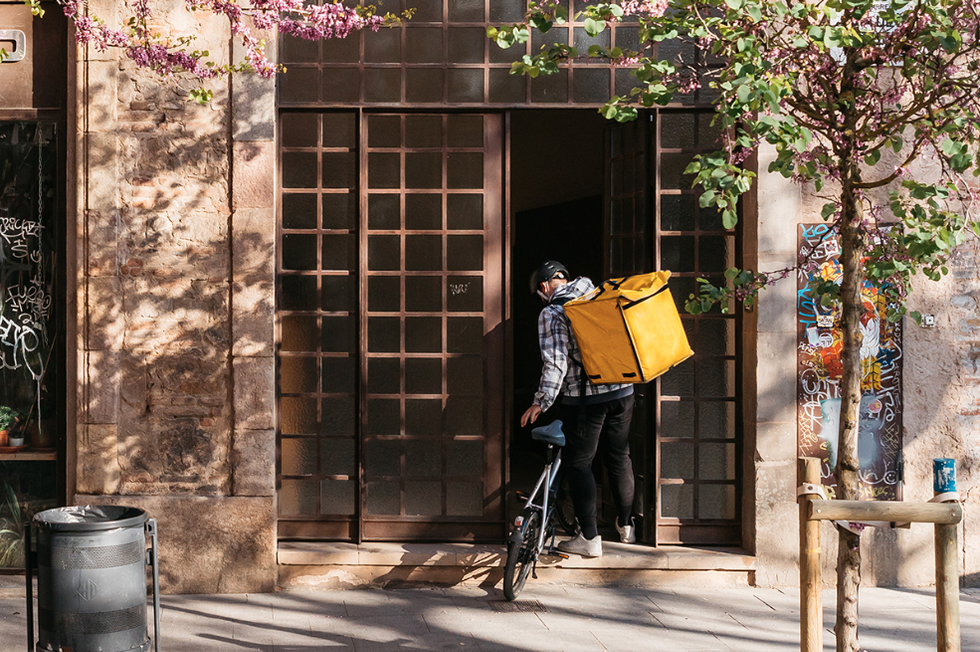Is the gig economy finally over?
Mar 22, 2021
7 mins

PY
Journalist
A landmark court ruling that granted basic employment rights to Uber’s UK drivers is the latest in a list of legal wins across Europe for gig workers. Last September, a Spanish court similarly found that those working for food delivery app Glovo were employees, not freelancers—which could entitle them to labor contracts and employment benefits— while in February Italian prosecutors fined UberEats, Glovo, Just Eat and Deliveroo €733 million following an investigation into the working conditions of riders.
These key legal rulings, alongside increasing unionization, public awareness, and political will across the continent, have raised the question: is time finally up for the exploitative gig economy?
During the first year or so of Azeem Hanif’s work for Uber, the system worked “very well”. The investment of around £6,000 for vehicle insurance, license fees, and taxes he had to make in 2015 was significant, but the 48-year-old from Nottingham says the promise of “working when, where, and however long you wanted” paid off.
“Then it started to go downhill very quickly,” said Hanif, who mostly worked as a driver on weekends. He says that platform drivers began to have their rights gradually chipped away—and that customer experience always came above fairness. “You were constantly looking over your shoulder, wondering if a rider would complain about you. Uber wouldn’t listen to drivers, and they would suspend you until the investigation was over,” he said. “You could be stopped working for a week over nothing. The events got really frustrating.”
Platforms in the gig economy assign work on a job-by-job or short-term basis, which, until now, has meant that workers are classed as self-employed contractors with no employment rights. But on March 16, 2021, Uber said it would guarantee minimum wage, holiday pay, and pensions to its 70,000 drivers in the UK. This followed a landmark ruling by the Supreme Court the previous month, which found that Uber drivers must be treated as workers rather than self-employed. The two ex-Uber drivers fighting for their rights in a five-year legal battle with the gig economy giant had finally won.
Time’s up
The Uber announcement, which will mean that its workers earn at least the National Living Wage—£8.72 an hour, increasing to £8.91 on April 1, 2021—is likely to have repercussions across the wider gig economy.
“These developments are incredibly exciting,” said Dr. Jamie Woodcock, a senior lecturer in management at the Open University and author of The Gig Economy. “Workers’ platforms have spread across the world—and solidarity has spread across national borders. It shows a direction of travel to a fairer kind of work rather than a continuing deterioration of standards that had been the trend.”
The shifts are part of growing momentum across the continent, where 11% of the EU workforce have already provided services through a platform. In February, the ruling in Italy that led to fines totaling €723 million for UberEats, Glovo, Just Eat and Deliveroo resulted in the Milan prosecutors’ office stating that more than 60,000 couriers must be offered contracts with fixed payments. Meanwhile, in France, Just Eat opened 4,500 permanent contract positions for delivery drivers across 30 cities in January.
Is it too early for gig workers to celebrate?
Many of these platforms, which are facing serious financial implications, are not accepting judgments willingly. According to a widely reported Deutsche Bank worst-case scenario estimate, the UK ruling means Uber could be forced to pay $2.5 billion (£1.8 billion) in VAT back-taxes, as well as a potential 30% rise in future prices.
Following the Supreme Court’s ruling on February 19, 2021, the company first responded by sending all drivers on the app a message telling them their rights hadn’t changed, before the recent U-turn to offer some improved working rights. There are also questions about the company’s decision to calculate working time from when a trip commences, not when a driver logs on. Uber Eats couriers are not part of the deal either.
For that reason, drivers are urging caution over celebrating. “It’s a good step in the right direction,” said Hanif, who stopped working for Uber and now uses another platform. “But unfortunately they’ve still stepped below the mark. Uber is still not on the level of the Supreme Court ruling by paying from when drivers log on the app to logging off. We still have a fight on our hands.”
Tom Vickers, a sociologist at Nottingham Trent University and head of the Work Futures Research Group, says the process of having rights filter down to the daily lives of Uber drivers will be a much longer struggle. “It will probably rely on lots more drivers going to employment tribunals and using the Supreme Court ruling as a precedent,” he said.
“It won’t be straightforward. These are deep-rooted trends in Britain and across Europe. In society, the wider trend has been of weakening workers’ rights, driven by a long-term crisis of capitalism, leading to workers being squeezed even more.”
Every victory counts
As the legal wranglings look set to drag on, Hanif believes that the ruling is nonetheless a key step forward and a clear recognition of how the situation must change. “The ruling showcases how the gig economy is not immune to fighting for workers’ rights,” he said. “The law has been tested and proven now—it gives a lot of hope to people working in the gig economy. We are at the next stage of our fight—workers’ recognition is achieved, but now the platforms must be forced to follow the law.”
Vickers agrees that the UK ruling is a pivotal moment. “It is very important,” he said. “It’s something a wider range of workers will be able to draw on. I think it will make drivers much more confident in asserting their rights.”
From workers’ unions to political action
Battered by harsh employer practices and precarious employment rights, workers across Europe have begun to fight back and unite against what they say is the overwhelming power of digital platforms.
In late 2017 Hanif and other drivers in Nottingham set up a local branch of the United Private Hire Drivers union, which has become part of the App Drivers & Couriers Union. “The platforms want cheap labor and essentially drivers are expendable,” he said. “Drivers’ mental health was constantly up in the air. We decided we needed better accountability.”
Workers’ representatives argue the solution to overcoming such issues will be a shift in focus from the successful grassroots movements established by workers to an institutional, political movement of change led by governments. “The limits with these rulings, although successful, is that they are on an individual, case-by-case basis and that there is no proper enforcement of them,” said Ludovic Voet, lead for platforms at the European Trade Union Confederation (ETUC), which represents 45 million workers across 38 European countries.
“For real change, we need a political movement. But it cannot be through rigid regulation, it must be flexible to ensure that we can protect workers as the world evolves.”
Spain leads the way
Promising developments can be observed in Spain, which experts say has been crucial for the legal developments in the gig economy across Europe. Antonio Aloisi, an assistant professor of European and Comparative Labour Law at IE University in Madrid, points to the decision by the European Court of Justice in 2017, which he says began with a claim in Spain’s commercial court. According to Aliosi, the recent Italian court case was “heavily influenced” by the Spanish ruling in September 2020.
The labor law expert believes the country is also leading the way for political reform of the gig economy. “In Spain, the inspectorate has been very active,” he said. “Policymakers are considering adopting a new law where riders will be considered to be workers by default and it will be up to platforms to prove otherwise. We could witness a radical shift not only in awareness but achievements—in courts as well as in the political sphere.”
No guarantees
In France, there were signs of serious political will for reform in 2020 when former prime minister Édouard Philippe announced plans to introduce better social protection and a specific status for delivery people. However, this has yet to become a reality, and dozens of protests held by delivery drivers have since taken place.
Ludovic Rioux, a 24-year-old food delivery driver in Lyon who began working for Deliveroo in October 2018, is among employees who harbor serious skepticism over celebrating any victory. But he is nonetheless one of the 4,5000 drivers that Just Eat France has pledged to hire on a full-time contract, with boss Jitse Groen claiming “we want to be sure that they have protections” in January 2020.
“The lack of rights we’ve faced since the beginning has changed,” said Rioux. “That’s a good thing. But all platform workers should have a requalification of their contract to more traditional contract terms. For now, platforms can still decrease the payments at any moment—we don’t have any guarantees.”
Pan-European action
Those claims could be borne out by a pan-European challenge to the gig economy model, following the European Commission’s recent launch of a public consultation to look into the legal employment status and conditions of gig economy workers. It represents the bloc’s first phase of improving the rights of platform workers and the EU is set to propose a regulatory framework by the end of the year.
In a statement, the commission said the gig economy model provided opportunities and offered “increased flexibility, job opportunities, and additional revenue, including for people who might find it more difficult to enter the traditional labor market”. But it also pointed out “precarious working conditions, reflected in the lack of transparency and predictability of contractual arrangements, health, and safety challenges, and insufficient access to social protection” as well as challenges related to algorithms.
The proposals will begin with a six-week consultation between trade unions and employers about how to improve working conditions, and if labor and business representatives don’t enter negotiations, there will be a second round of consultations on possible measures the EU could take. If the two sides can’t come to an agreement after that, the commission said it will “put forward an initiative by the end of the year”.
A long battle ahead
Consensus among campaigners is that the pandemic has brought the plight of these frontline gig workers into even sharper focus. But that, in the face of spiking unemployment and the digitalization of labor, the gig economy is only set to become even more prominent.
“This is why it’s a very important battle,” said Livia Spera of the European Transport Workers’ Federation. “This is only starting and it will arrive in more sectors: catering, cleaning, and babysitting. We’ll have ambulance workers just when they are needed. Uber has even looked into long-distance freight transport. At the moment it’s so unclear and there is a need for us to regulate.”
As for Uber’s latest announcement, Jamie Heywood, its regional general manager for Northern and Eastern Europe, said in a statement: “This is an important day for drivers in the UK. Uber is just one part of a larger private-hire industry, so we hope that all other operators will join us in improving the quality of work for these important workers who are an essential part of our everyday lives.”
A spokesperson for Just Eat said the company had rolled out a “worker and employment model” where couriers are eligible for benefits including hourly pay, holiday pay, and sick pay.
Deliveroo and Glovo did not respond to requests for comment.
Photo: Welcome to the Jungle
Follow Welcome to the Jungle on Facebook, LinkedIn, and Instagram, and subscribe to our newsletter to get our latest articles every day!

More inspiration: Society for workers

How auto unions are advancing the idea of a shorter working week for all
As support for the 4-day workweek keeps gaining steam, the industry that ushered in the 5-day workweek is still at the forefront
Nov 27, 2023

“Many American workers and families break even at best.”
An economics reporter breaks down the complex landscape of today's economy.
Nov 23, 2023

When your workplace is literally toxic — but you’re a kid
In the US, caustic chemicals, scalding appliances, and dangerous machinery are all in a day’s work for a growing body of exploited children.
Nov 07, 2023

So, are robots really coming for our jobs? A conversation with futurist Gary Bolles
Fears of an AI apocalypse loom large, but what are experts saying about the future?
Mar 07, 2023

With a universal income, will we stop working?
Universal income is gaining traction in Europe, but questions about essential jobs remain…
Dec 21, 2022
The newsletter that does the job
Want to keep up with the latest articles? Twice a week you can receive stories, jobs, and tips in your inbox.

Looking for your next job?
Over 200,000 people have found a job with Welcome to the Jungle.
Explore jobs